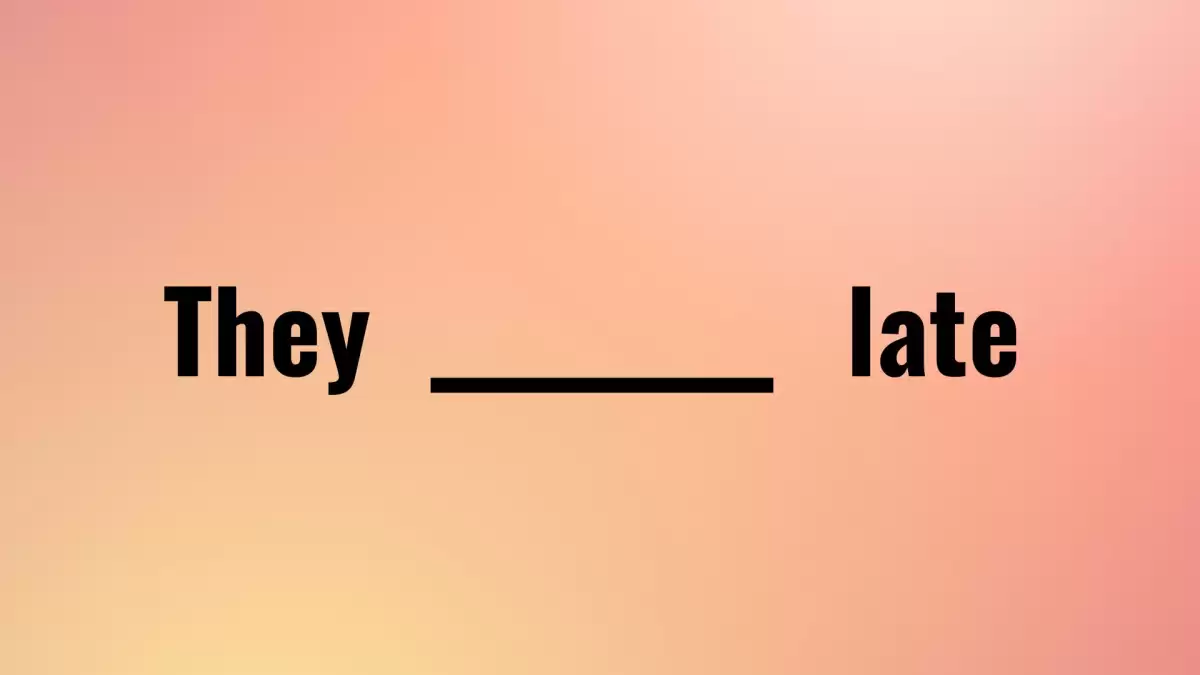Solve These Three Grammar Questions in the Puzzle Here is a challenging grammar puzzle for you. If you like solving mysteries like this, feel free to give it a go.
Solve These Three Grammar Questions in the Puzzle
Explore the world of grammar puzzles. These puzzles make you think and use your grammar skills. They’re fun and can help your mind stay active and less stressed. There are many different grammar challenges to enjoy, including the ones coming up. This challenge might be a bit tricky, and it’s great for people who are good at grammar and notice small details. When you become a master at this kind of puzzle, it’s not just about having fun; it also gives you skills that can be useful in many parts of your life. Even though the puzzle might seem hard at first, your goal is to find a solution that follows grammar rules and reveals the puzzle’s secrets. The next section will explain this grammar puzzle in detail and show you how to solve it.
1. They ___ late
The word “arrived” in the sentence “They arrived late” is used to describe the action of reaching a destination, in this case, arriving at a specific place. In English, “arrived” is the past tense form of the verb “arrive,” and it tells us that this action took place in the past. The addition of “late” indicates that the arrival occurred after the expected or planned time. In straightforward terms, “They arrived late” means that they got to their destination later than they were supposed to.
2. I ___ books daily
The word “read” in the sentence “I read books daily” is used to describe the action of reading. In English, “read” is the present tense form of the verb “read,” which means to look at and understand the meaning of written or printed words. In this sentence, it tells us that the action of reading books is a daily habit. “Daily” indicates that this is something done every day. So, when you say “I read books daily,” it means that you regularly engage in the activity of reading books, and you do it every day.
3. The chef ___ a delicious meal
The phrase “had prepared” in the sentence “The chef had prepared a delicious meal” is structured in the past perfect tense. In English, this tense is used to express an action that was completed before another past action or at a specific point in the past. “Prepared” is the past participle of the verb “prepare,” indicating that the action of making the meal was done before the point in time being referred to. So, when you say “The chef had prepared a delicious meal,” you’re emphasizing that the meal was ready and delicious before a certain past moment or event.
Calculate the Total of 252 ÷ 14 + 7 x 4 – 56 ÷ 8=?
To solve this calculation, use the order of operations. Begin with the divisions and multiplications from left to right: 252 ÷ 14 equals 18, and 56 ÷ 8 equals 7. The equation becomes 18 + 7 x 4 – 7. Now, carry out the multiplications and additions/subtractions from left to right: 7 x 4 equals 28, and 18 + 28 equals 46. Therefore, the solution is 46.
Whether you’re a student, a professional, or simply someone who enjoys a good mental workout, Fresherslive is your destination. Our Brain Teaser vary in complexity, ensuring there’s something for everyone.
Solve the Equation 360 ÷ 12 + 7 x 3 – 63 ÷ 7=?
For this problem, apply the order of operations. Start with the divisions and multiplications from left to right: 360 ÷ 12 equals 30, and 63 ÷ 7 equals 9. The equation becomes 30 + 7 x 3 – 9. Next, perform the multiplications and additions/subtractions from left to right: 7 x 3 equals 21, and 30 + 21 equals 51. Thus, the answer is 51.
Disclaimer: The above information is for general informational purposes only. All information on the Site is provided in good faith, however we make no representation or warranty of any kind, express or implied, regarding the accuracy, adequacy, validity, reliability, availability or completeness of any information on the Site.
Let the article source Solve These Three Grammar Questions in the Puzzle of website nyse.edu.vn
Categories: Brain Teaser
